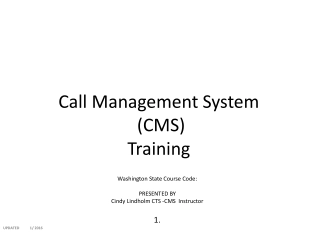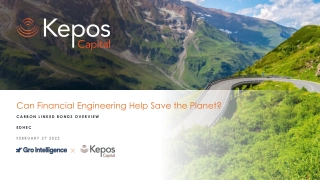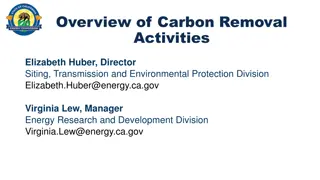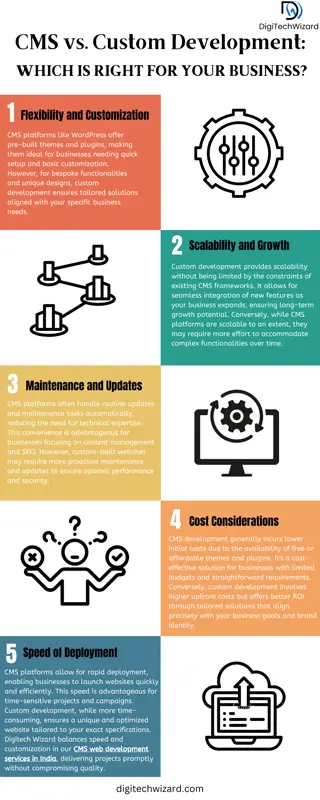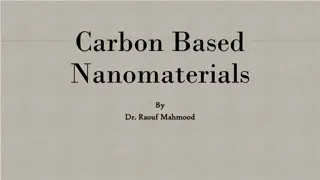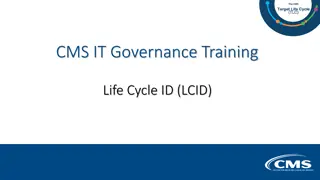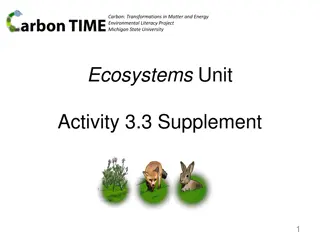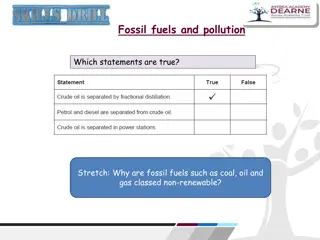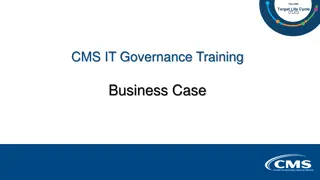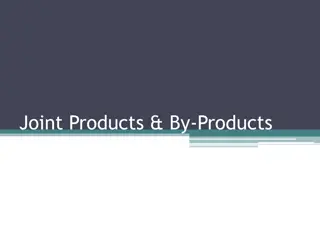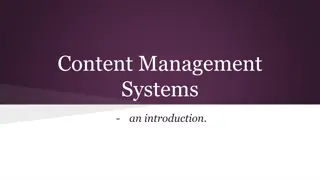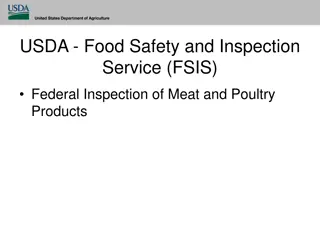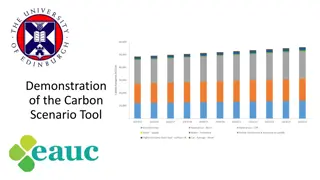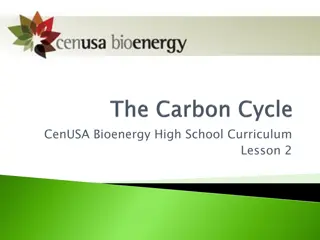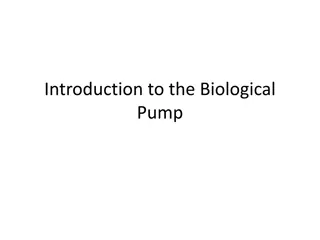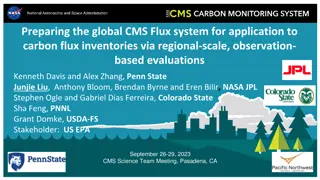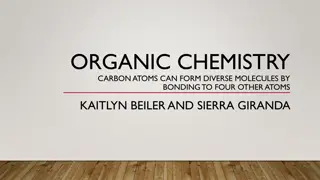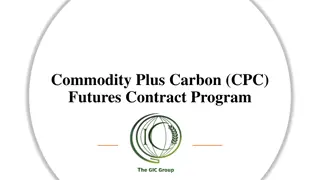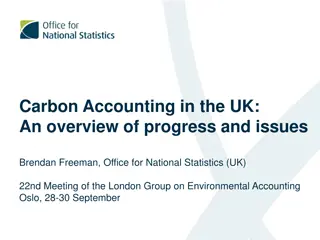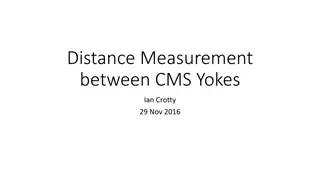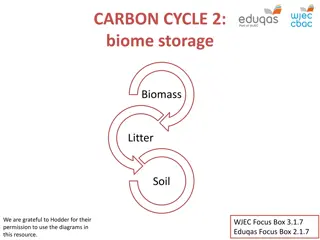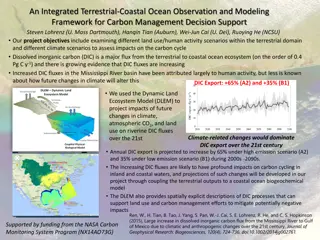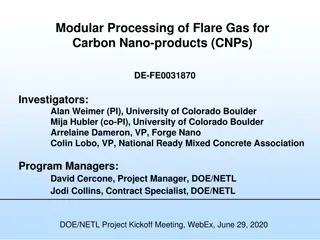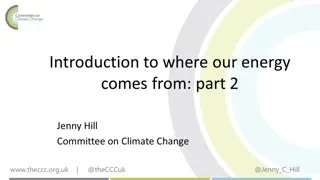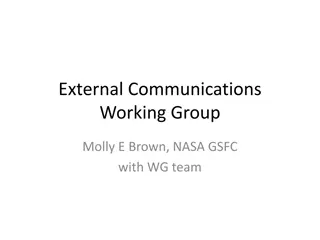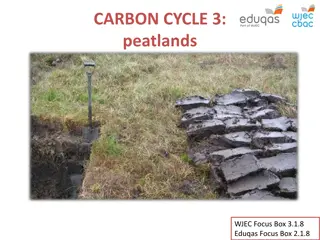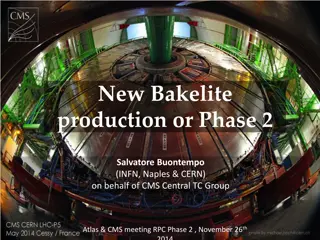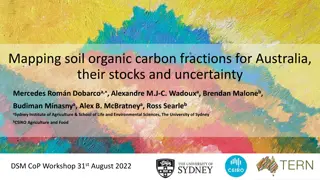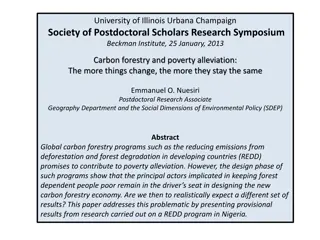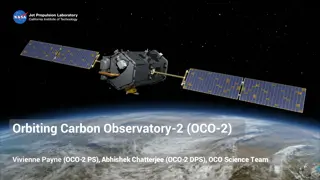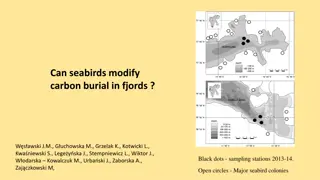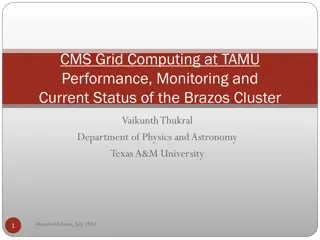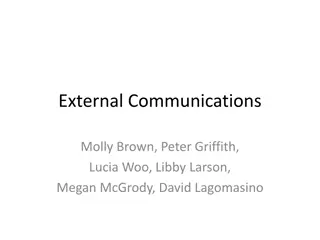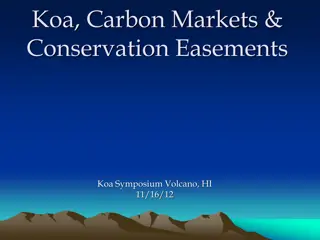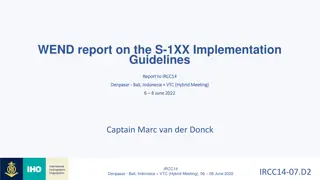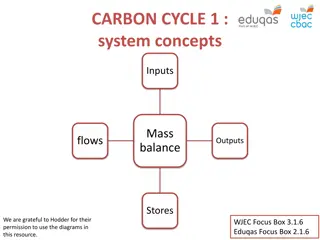Comprehensive Call Management System (CMS) Training Overview
An extensive training course on Call Management System (CMS) in Washington State, presented by Cindy Lindholm, covers CMS introduction, real-time and historical reports, and advanced features. The training explains CMS and Automatic Call Distribution (ACD), their components, and essential terms like
3 views • 41 slides
Can Financial Engineering Help Save the Planet?
Explore the potential of financial engineering in combating climate change through carbon-linked bonds. Dive into the concept of scaling low carbon investments, optimizing portfolio allocations, and creating credibility using financial tools. Discover how the Carbon Barometer aggregates data to trac
0 views • 13 slides
Harnessing Carbon Markets for Sustainable Development in Pakistan
Understanding the significance of carbon markets, this content delves into the interplay between economic growth and environmental sustainability, emphasizing the urgency to limit unsustainable practices. It explores mechanisms such as carbon pricing and cap-and-trade systems in the context of clima
0 views • 17 slides
Carbon Pricing Overview and EU Green Deal Agenda
The overview of carbon pricing inside the EU highlights key aspects such as the EU Green Deal, revision of the EU ETS, and the Carbon Border Adjustment Mechanism. The EU aims for carbon neutrality by 2050 with a 55% reduction target. The Fit for 55 initiative emphasizes relevance for the Energy Comm
4 views • 16 slides
Overview of California's Carbon Removal Initiatives
California's Carbon Removal Innovation Support Program (CRISP) aims to incentivize Direct Air Capture (DAC) development in the state. The program includes research test centers, small-scale demonstrations of DAC technologies, community engagement, technical assistance, and more to enhance carbon rem
0 views • 5 slides
Understanding the Carbon Cycle: Reservoirs, Dynamics, and Importance
Earth's carbon cycle plays a crucial role in sustaining life, with carbon moving through various reservoirs and processes. This cycle involves short-term terrestrial and marine cycles, as well as long-term cycles influenced by volcanic activity and rock weathering. Understanding carbon reservoir dyn
6 views • 45 slides
CMS vs. Custom Development Which Is Right for Your Business
Discover the best choice for your business: CMS vs. Custom Development. Digitech Wizard helps you navigate with expert insights. Contact us at 966 7007 269.\nVisit us:\/\/digitechwizard.com\/cms-web-development.php\n
0 views • 1 slides
Understanding Carbon-Based Nanomaterials and Their Technical Applications
Carbon-based nanomaterials, including fullerenes and carbon nanotubes, have revolutionized various industries with their unique properties. These materials, classified based on their geometrical structure, have applications in fields such as electronics, gas storage, biotechnology, and more. Fullere
0 views • 12 slides
Understanding CMS IT Governance Training Life Cycle ID (LCID)
CMS IT Governance Training Life Cycle ID (LCID) is a crucial aspect of IT project management within the CMS organization, ensuring proper approval and tracking of IT activities. This ID is not a funding approval but signifies evaluation for feasibility, standards, and cost-effectiveness. It is essen
0 views • 11 slides
Tracing Carbon Atoms in Ecosystems: Understanding the Organic Matter Pyramid
Explore the journey of 500 carbon atoms through producers, herbivores, and carnivores in an ecosystem. Discover how carbon atoms move through photosynthesis, cellular respiration, and biosynthesis, ultimately contributing to the organic matter pyramid. Follow the pathways of carbon atoms as they cyc
0 views • 7 slides
Understanding Fossil Fuels and Pollution: A Comprehensive Overview
Fossil fuels such as coal, oil, and natural gas are non-renewable energy sources that release heat energy when burned, but also contribute to pollution when not burned completely. This leads to the release of harmful pollutants like carbon dioxide, carbon monoxide, sulfur dioxide, and carbon particu
2 views • 9 slides
IT Governance Business Case Overview
IT Governance at CMS involves the Target Life Cycle (TLC) framework that requires completion of a Business Case for new IT projects. The Business Case outlines the business need, benefits to CMS, alignment with organizational priorities, performance measurement, and proposed alternatives to meet the
4 views • 10 slides
Understanding CMS Complaint Tracking Module (CTM) for Medicare Plans
The CMS Complaint Tracking Module (CTM) is a system that enables SHIPs to assist beneficiaries with issues related to Medicare Advantage Plans or Part D Plans. By utilizing CTM, complaints are routed to CMS for resolution, potentially impacting plan performance measures. This article discusses the p
2 views • 11 slides
Understanding Joint Products and By-Products in Manufacturing Processes
Joint products and by-products are key concepts in manufacturing processes, where joint products are of almost equal value and importance, while by-products have relatively small value but emerge incidentally. Co-products are produced simultaneously but not from the same raw material. This article e
0 views • 10 slides
Understanding Content Management Systems
Content Management Systems (CMS) are computer applications that enable easy publishing, editing, and management of content on websites. They help in organizing, maintaining, and updating content efficiently from a centralized interface. With features like web-based publishing, revision control, and
4 views • 10 slides
United States Food Safety and Inspection Service: Ensuring Meat and Poultry Products' Safety
The United States Department of Agriculture's Food Safety and Inspection Service (FSIS) oversees the federal inspection of meat and poultry products to ensure their safety for human consumption. The statutes governing this process include the Federal Meat Inspection Act, the Poultry Products Inspect
0 views • 23 slides
Understanding the Carbon Scenario Tool for Climate Change Management
The Carbon Scenario Tool (CST) is a valuable resource developed by the University of Edinburgh and the Scottish Funding Council to manage, report, and forecast carbon emissions for university estates and operations. It enables the calculation of the impact of carbon reduction projects and the develo
2 views • 18 slides
Understanding Carbon Movement in the Environment
Explore the intricate processes of carbon movement in the biosphere, atmosphere, oceans, and geosphere. Learn how plants absorb carbon dioxide, animals utilize carbon for tissue building, and the impacts of human activities like burning fossil fuels on carbon distribution. Discover the critical role
0 views • 6 slides
Understanding the Biological Pump and Carbon Cycle in the Ocean
The biological pump in the ocean involves photosynthesis by phytoplankton, which removes carbon dioxide from the atmosphere, and respiration, where some CO2 is released back. Phytoplankton are crucial in the ocean's carbon cycle, with primary consumers like zooplankton depending on them for energy.
0 views • 20 slides
Application of CMS-Flux System for Carbon Flux Inventories Evaluation
Preparation for the global CMS Flux system integration with US forest and agricultural carbon inventory data to quantify uncertainties and enhance inventory-relevant flux estimates. The project aims to evaluate the utility of CMS-Flux-NA system for top-down assessment of US agricultural and forest C
2 views • 21 slides
Understanding Organic Chemistry: Carbon Atoms and Molecular Diversity
In organic chemistry, carbon atoms can form diverse molecules by bonding to four other atoms, leading to molecular complexity and diversity. The versatile nature of carbon allows for the formation of various carbon skeletons, contributing to the vast array of organic compounds. Hydrocarbons, consist
0 views • 12 slides
Innovative CPC Futures Contract Program for Agribusiness Sustainability
The Commodity Plus Carbon (CPC) Futures Contract Program integrates agricultural commodity prices with carbon valuation to incentivize good agricultural practices and reduce carbon footprint. By combining ag commodity prices with carbon reductions, CPC contracts offer hedging opportunities and incen
0 views • 8 slides
Overview of Carbon Accounting in the UK: Progress and Challenges
The project aims to test the feasibility of producing SEE-EEA style Carbon Accounts, assess data sources, and lay a path for further development. Carbon accounting in SEE-EEA identifies carbon as a key theme, supporting ecosystem measurement. The UK's carbon accounts cover geosphere, biosphere, ocea
0 views • 15 slides
Distance Measurement Using IR Sensors for CMS Yokes - Analysis and Calibration
Using remote sensing with IR sensors and Arduino Uno, the study measures distances between CMS yokes. Initial results show accuracy between 30-150mm, but lower values need further calibration due to IR sensor response limitations. Future work includes developing code for multiple sensors and creatin
0 views • 5 slides
Understanding Carbon Storage in Biomes and Ecosystems
Explore the intricate carbon cycle within terrestrial ecosystems, focusing on carbon storage in biomass, litter, and soil. Delve into the differences in plant characteristics among various biomes and their impact on carbon sequestration. Gain insights into the distribution of tropical rainforests an
0 views • 13 slides
Integrated Terrestrial-Coastal Ocean Framework for Carbon Management
An advanced framework integrating terrestrial and coastal ocean observations and modeling is developed to support carbon management decisions. The study focuses on assessing the impacts of land use, human activities, and climate scenarios on the carbon cycle, particularly dissolved inorganic carbon
0 views • 5 slides
Sustainable Conversion of Flare Gas into High-Value Carbon Nano-products
This project focuses on modular processing of flare gas to produce carbon nano-products, aiming to address the challenges of natural gas flaring in the United States. With a three-year timeline and a total budget of $3,750,000, the interdisciplinary team led by the University of Colorado Boulder see
0 views • 36 slides
Achieving UK Net-Zero: Strategies for Carbon Capture and Low-Carbon Fuels
Explore the pathways to achieving UK net-zero carbon emissions through carbon capture, low-carbon alternative fuels like hydrogen and bioenergy, and sustainable bioenergy practices. Learn about the importance of zero-carbon hydrogen production and the challenges and benefits of utilizing bioenergy f
0 views • 12 slides
Enhancing Communication and Engagement for NASA's Carbon Monitoring System
The External Communications Working Group led by Molly E. Brown at NASA GSFC focuses on creating materials for the carbon.nasa.gov website to communicate the products, science, and impact of NASA's Carbon Monitoring System (CMS). Their objectives include broadening and strengthening knowledge of CMS
0 views • 11 slides
Understanding Peatlands and Carbon Storage in the Carbon Cycle
Peatlands are vital landscapes where peat accumulates, storing large amounts of carbon. Learn about peat formation, anaerobic conditions, different types of peatlands, and the significant role peatlands play in carbon storage globally. Explore the link between water cycle and peat formation, emphasi
0 views • 12 slides
New Bakelite Production Phase 2: Salvatore Buontempo Presentation at CMS Central TC Group Meeting
Salvatore Buontempo presented on behalf of CMS Central TC Group at a meeting discussing Bakelite production facilities in Puricelli for CMS RE4 production. The presentation covered new production constraints, quality control measures, and details of the production facilities including a large craft
0 views • 11 slides
Mapping Soil Organic Carbon Fractions in Australia: Stocks and Uncertainty
This study by Mercedes Román Dobarco et al. focuses on mapping soil organic carbon fractions across Australia, including mineral-associated organic carbon, particulate organic carbon, and pyrogenic organic carbon. The research involves prediction of soil organic carbon fractions using spectral libr
0 views • 17 slides
Carbon Forestry and Poverty Alleviation: The Case of REDD in Nigeria
Global carbon forestry programs like REDD aim to alleviate poverty but face challenges in empowering forest-dependent communities. The paper discusses the role of key actors in maintaining the status quo, presenting research findings from a REDD program in Nigeria. Carbon forestry involves market-ba
0 views • 15 slides
Insights from Orbiting Carbon Observatory-2 (OCO-2) on Global Carbon Cycle
Orbiting Carbon Observatory-2 (OCO-2) offers precise measurements to understand sources and sinks of CO2 in the atmosphere, providing valuable data on carbon uptake by plants and global carbon emissions. OCO-2's findings shed light on the impact of extreme climate events like droughts and fires on t
0 views • 8 slides
Carbon Modification by Seabirds in Fjords: Implications and Patterns
The study investigates the impact of seabirds on carbon burial in fjords, showcasing factors such as wind stress patterns, terrestrial vegetation biomass, and various carbon sources in the ecosystem. It delves into the distribution and fate of carbon in two fjords, Hornsund and Kongsfjorden, sheddin
0 views • 7 slides
Performance and Monitoring of CMS Grid Computing at TAMU
Vaikunth Thukral's 2011 Masters Defense presentation at Texas A&M University focused on the performance, monitoring, and current status of the Brazos Cluster in the context of Grid Computing with CMS. The presentation covered topics such as data transfers, data storage, job summaries, PhEDEx, CRAB,
0 views • 30 slides
Enhancing External Communications for CMS Carbon Products
Enhance external communications for CMS Carbon Products by drafting plans and action items, engaging stakeholders, and improving presentation of information using thematic categories. Collaborate with the Data WG to improve product fact sheets and engage stakeholders beyond existing sets. Implement
0 views • 5 slides
Exploring the Intersection of Koa, Carbon Markets, and Conservation Easements
Delve into the intricate relationship between Koa forests, carbon markets, and conservation easements. Discover the ecosystem services provided by Koa trees, the value of Koa wood products, and important considerations when entering into conservation easements. Explore the potential of the carbon ma
0 views • 9 slides
WEND-100 Implementation Guidelines Report to IRCC14 Denpasar, Bali, Indonesia + VTC (Hybrid Meeting)
IHO Resolution 1/2021 introduces the WEND-100 principles, with complementary guidelines detailing their implementation for S-1XX products. The report discusses the applicability of WEND-100 principles for S-100 based products, focusing on specific S-1XX products planned for release before S-101. It
0 views • 12 slides
Understanding the Carbon Cycle: System Concepts and Pathways
The carbon cycle involves the movement of carbon between different stores in the global system, such as the atmosphere, oceans, and biosphere. Flows, inputs, and outputs play crucial roles in this cycle, with processes like photosynthesis and respiration impacting carbon levels. Explore how mass bal
0 views • 13 slides
